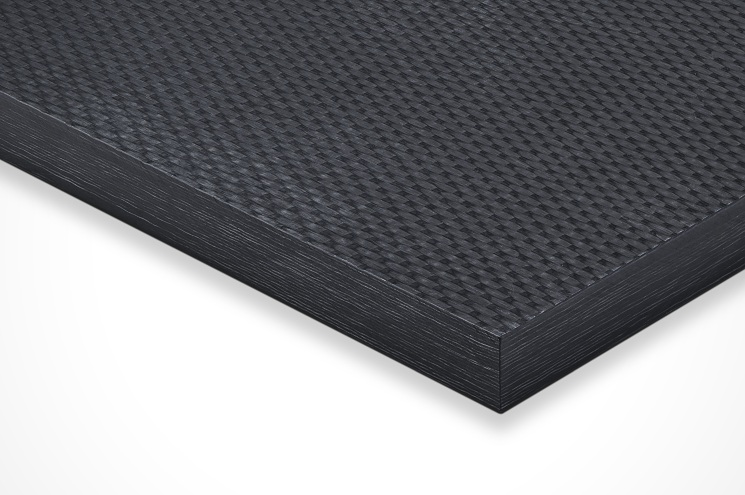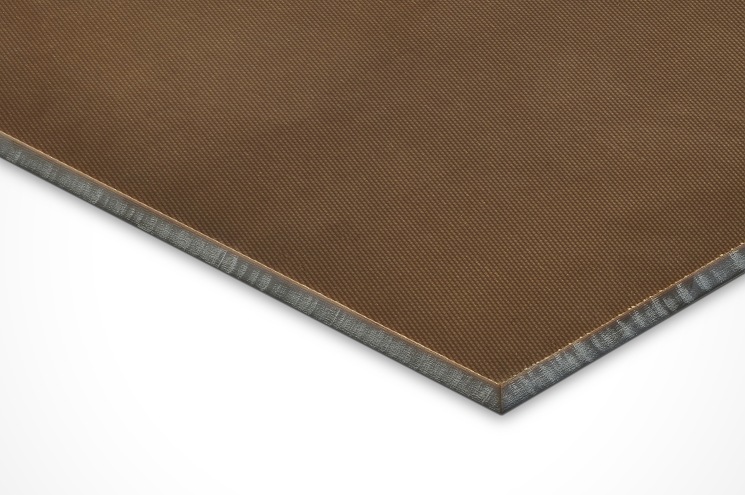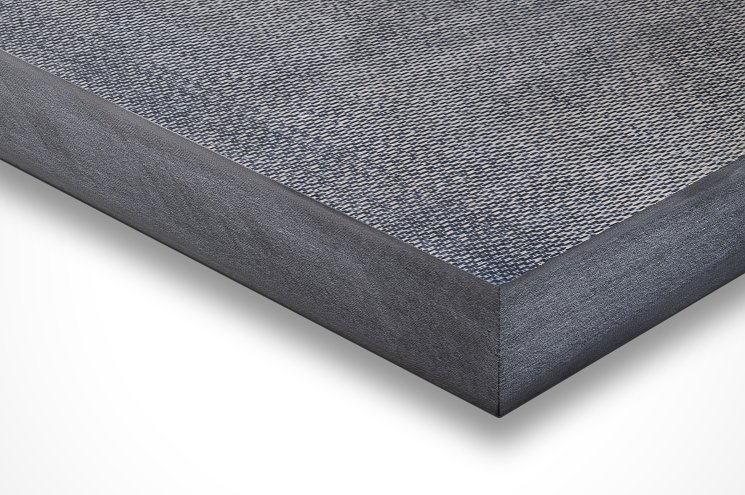Ensinger presents continuous fibre-reinforced thermoplastic plates for industry
For applications where the mechanical requirements are too high for unreinforced or short fibre-reinforced plastic stock shapes, continuous fibre-reinforced thermoplastic plates offer an excellent alternative. Thanks to the continuous fibre reinforcement, usually a woven fabric of glass or carbon fibres, they have mechanical properties otherwise achieved only by metallic materials. At the same time, they are significantly lighter than most metal-based alternatives.
Through the use of thermoplastic matrix materials, the plates nevertheless have the same advantages as unreinforced plates made from thermoplastic materials: high impact strength, constant properties over a broad temperature range, chemical resistance and high elongation at break. By selecting a suitable matrix material, a wide range of customer needs can be met.
Plates made from continuous fibre-reinforced thermoplastics can be processed into finished parts of outstanding quality with minimal tolerances. Alongside water jet cutting, conventional processing methods are also suitable – assuming suitable facilities and processing parameters.
3 new materials
Ensinger has widened its portfolio of composite plates to include three new materials:
TECATEC PPS CW50 black (PPS CFK – Polyphenylene sulfide, carbon fibre-reinforced)
- Excellent high-temperature resistance
- Very good chemical resistance
- Very good dimensional stability over a broad temperature and humidity range
- Carbon fibre reinforcement increases stiffness and strength
 |
|
TECATEC PEI GW50 natural (PEI GFK – Polyetherimide, glass fibre-reinforced)
- High continuous service temperature (170°C)
- Good electrical insulation
- Fire, smoke and toxicity retardant (FST)
- Glass fibre reinforcement increases the mechanical properties while keeping costs down
 |
|
TECATEC PC CW50 black (PC CFK - Polycarbonate, carbon fibre-reinforced)
- Outstanding appearance thanks to crystal-clear, transparent matrix
- High impact toughness
- Carbon fibre reinforcement increases stiffness and strength
 |
|
As light as plastic, as stiff and strong as metal
The new composite plates from Ensinger have densities between 1.5 and 1.8 g/cm³, giving them a similar specific weight to unreinforced or short fibre-reinforced plates. Nevertheless, the reinforcing fibres increase their mechanical properties dramatically to a level similar to metal. Compared with unreinforced polymer plates, continuous fibre-reinforced plates achieve values that are 5 times higher for both tensile strength and Young’s modulus.
Low linear thermal expansion
Continuous fibre-reinforced thermoplastics exhibit extremely low coefficients of thermal expansion (CTE) in a range around 5x10-6 K-1. This property is of great importance for applications in which the parts are subjected to temperature fluctuations over a broad range and where high precision is required.
Outstanding mechanical properties
The thermoplastic matrix gives the plates high impact toughness, with the value significantly higher than in plates with a thermoset matrix such as epoxy or phenolic resins. Moreover, the high elongation at break of the thermoplastics ensures tough, non-brittle fracture behaviour. For some applications, the intrinsic vibration damping of the matrix can also be a relevant advantage.
Made-to-measure plates
Ensinger produces the thermoplastic composite plates to customer-specific requirements, with maximum dimensions of 525 x 625 mm. The manufacturer is also flexible when it comes to the plate thickness: in the range 0.5 to 95 mm, any thickness is possible.
Standard products are PEI with reinforcing woven glass fibre as well as PC and PPS with woven carbon fibre. Other matrix and fibre combinations, fibre architectures or customer-specific fibre lay-ups can be provided on request.
Fields of application
Fields of application for continuous fibre-reinforced thermoplastics include the aerospace industry, mechanical engineering, the automotive industry and the sports equipment sector. In particular for the manufacture of prototypes and small batches, stock shapes are of interest as an affordable option for making small quantities.
-
Ensinger s.r.o.
Technical plastics, plastic semi-finished products, rods, tubes and plates, blasting and CNC machining of plastics, plastic injection, plastic...
Plastic tubing by ABY profils: a sustainable solution for winding materials in a wide range of industries
23.8.2024 Industrial manufacturing has long been looking for ways to increase production efficiency while ensuring its sustainability. Of course, this trend also affects industries where material is wound: the production of plastic films, technical textiles,...


































